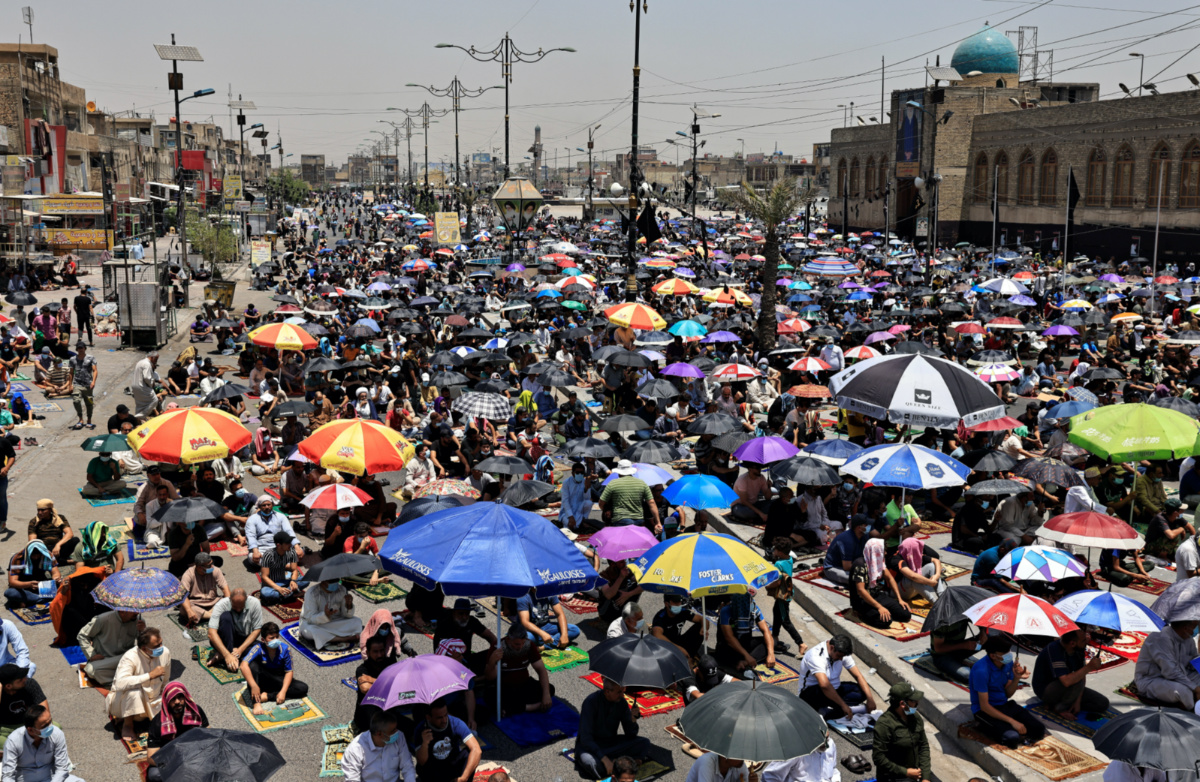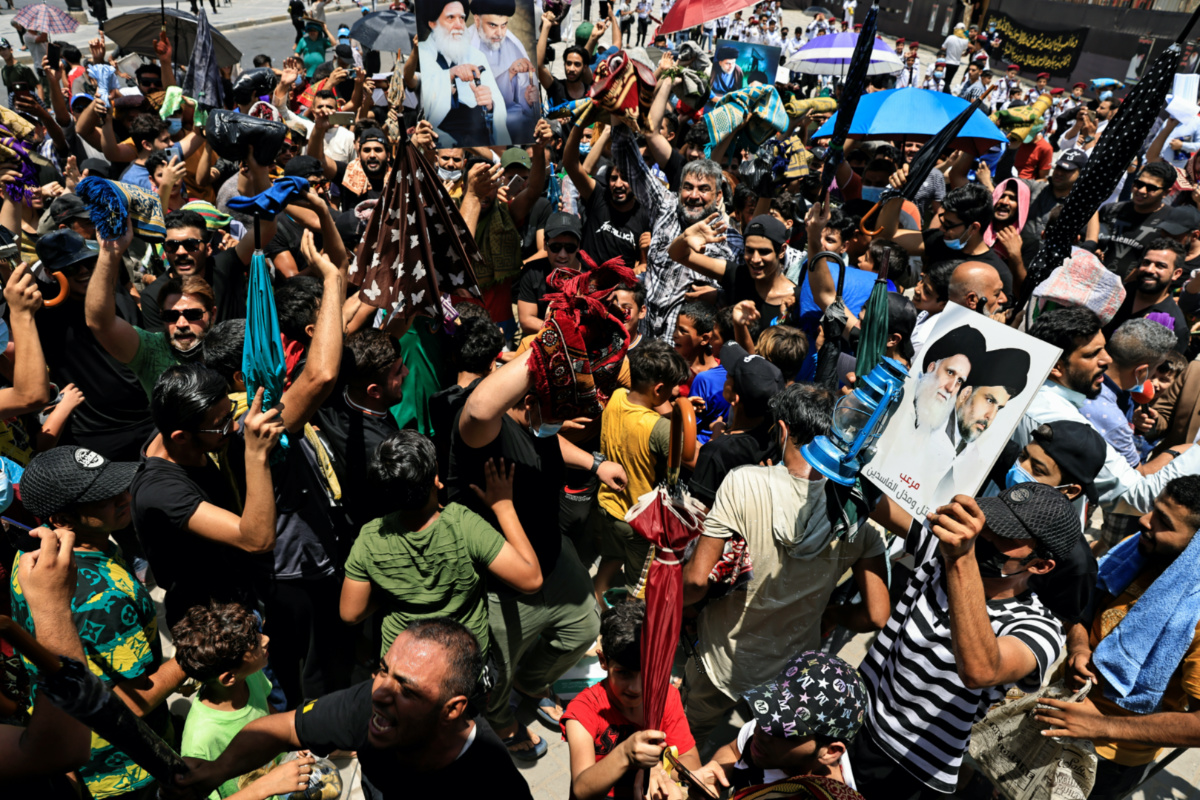
MAYA GEBEILY, of Thomson Reuters Foundation, reports on how power cuts have exposed Iraq’s economic divides…
Beirut, Lebanon
Thomson Reuters Foundation
No strangers to temperatures above 50 degrees Celsius, Iraqis are adept at finding ways to stay cool in summer. But a spate of recent power cuts has exposed a deep divide between the heatwave haves and have-nots.
While relatively well-off residents of the capital, Baghdad, can afford generators that crank into action when the national grid falters, others have been struggling to cope without air-conditioning, fridges and electric fans for days.

Supporters of Iraqi Shi’ite cleric Moqtada al-Sadr attend Friday prayers in Baghdad’s Sadr City, Iraq, on 2nd July. PICTURE: Reuters/Thaier Al-Sudani
Government employee Sadiq Sadkan pays about $US200 per month to access a generator supplying his middle-class neighbourhood during blackouts, which worsen amid surging summer demand.
“I’ve got a gold standard subscription to a private generator, which works 24 hours a day…it can turn on any time of the day,” Sadkan told the Thomson Reuters Foundation by phone from his home.
During sweltering summers, power outages can last up to 20 hours in the least-developed neighbourhoods. But in recent weeks, intermittent outages of 24 hours hit the whole country – even wealthier districts.
When at work in the national parliament, Sadkan also enjoys round-the-clock electricity in his office, meaning the air-conditioning whirrs all day and the water cooler stays chilled.
If the Baghdad heat is still too oppressive, he drives his three children 500 kilometres north for a long weekend in Zakho, a mountainous region that is regularly 15 degrees Celsius cooler than the capital.
“The middle and upper-class can still leave,” 41-year-old Sadkan said, but he fears that will not be an option for long as temperatures rise nearly everywhere.
“We’re seeing the temperatures go up year-after-year, and we know it’s because of climate change,” he said.
Rising heat is one of the clearest and most threatening effects of climate change, and temperatures in Iraq are increasing up to seven times faster than the global average, according to a 2017 study in the Atmospheric Research journal.
Iraq is a leading producer in the Organization of the Petroleum Exporting Countries, but its national grid has been worn down by years of conflict and poor maintenance.
Critics say an inefficient tariff system fails to incentivise power conservation, and there has been little investment in renewable energy so far.
During sweltering summers, power outages can last up to 20 hours in the least-developed neighbourhoods. But in recent weeks, intermittent outages of 24 hours hit the whole country – even wealthier districts.
No-one could immediately be reached to comment at the country’s electricity ministry.

Supporters of Iraqi Shi’ite Muslim cleric Muqtada al-Sadr shout slogans during a protest over frequent electricity cuts after Friday prayers in Baghdad’s Sadr City, Iraq, on 2nd July. PICTURE: Reuters/Thaier Al-Sudani
People who could not afford to pay for an expensive diesel-fuelled generator or flee Baghdad for the mountains sought refuge with relatives who live in better-served neighbourhoods.
Zahraa Jassim, 33, lives with her husband and two young daughters in a well-serviced residential compound, where power cuts are rare.
But her parents, who live in a less affluent neighborhood, get power just one or two hours a day. Her sister Elaf, who lives elsewhere in the city, had no state-provided electricity for days on end in late June.
“It’s 57 degrees inside her house,” Jassim said by phone.
When she called the electricity ministry’s hotline to complain about the outages affecting her relatives, the employee who answered the phone told her he had no power at home either.
“It’s an absolute disaster,” she said.
Worried about her sister’s three-year-old daughter and four-week-old newborn, who was sleeping most of the day, Jassim eventually invited her sister and the children to stay in her modest apartment.
“I told my sister they can stay here until the end of summer. I keep thinking, ‘What about people that don’t have anybody?'” she said.
Outside Jassim’s window, construction workers and other day laborers toil away under the sun, while men and boys hawk water bottles nestled in ice at traffic intersections nearby.
Iraq has not enacted the kind of heat protection laws implemented in other Gulf countries such as Qatar to protect workers, such as banning outdoor work during the peak heat season and making annual health checks mandatory.
Seif Talib, a 29-year-old filmmaker who lives in the southern Iraqi city of Basra, tries to cope with the heat by scheduling the shooting of outdoor scenes in the spring and saving indoor scenes and editing for the summer.
“The problem is that this year we have nationwide power outages for the first time,” Talib said by phone.
“The cameras and lights turn off every time the power cuts, and we can’t turn the air conditioning on at all. Our editing and production work is all late,” he said.
On the way home, Talib passes the Shatt al-Arab – the waterway into which Iraq’s twin Euphrates and Tigris rivers feed before reaching the Gulf.
“I’ve never seen so many people swimming there. They’re mostly poor people who don’t have a generator,” he said.
Most Iraqi homes need electricity to pump water into their bathrooms for a shower. But even when the water does arrive, it is often boiling hot.
Talib said that at his home the power has been off more than 12 hours each day since mid-June. His one-year-old daughter cries at night in discomfort, and Talib said he felt increasingly stressed.
“Temperatures higher than 50 degrees are normal for us. But the electricity, too? That’s such a complicated problem,” he said.





